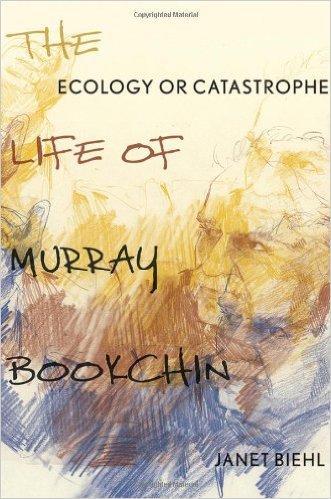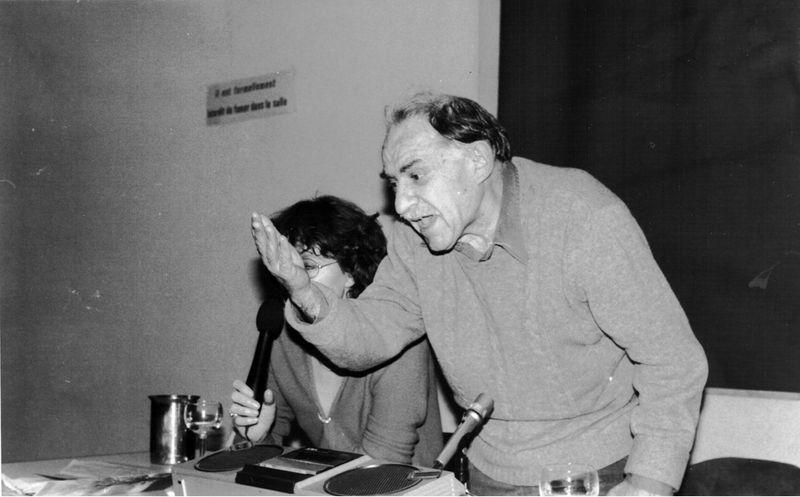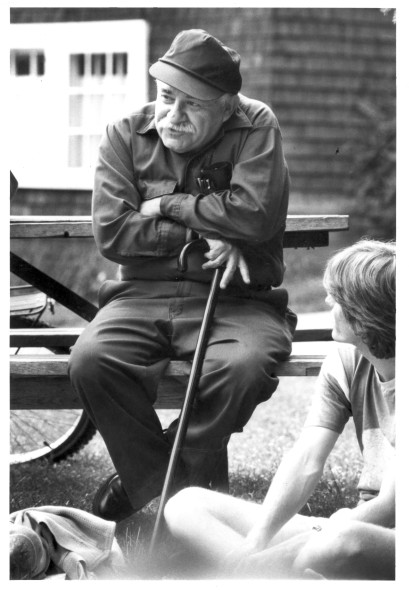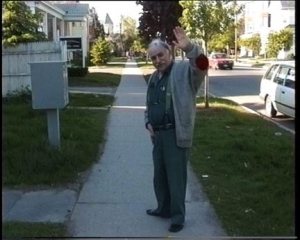
Murray Bookchin was a pivotal, polarizing figure in the post-WWII history of anarchism. He put ecology and democracy on the anarchist agenda in a way that was as novel as it is enduring. As a polemicist, he spent decades at the center of crucial debates about history, strategy, and foundational ideals. Even his critics must acknowledge that he made major contributions to the growth and clarification of the anarchist perspective.
Something shifted in the movement when he died in 2006. For the preceding fifty years, his writings had been a point of reference through which we could clarify our views, even when we disagreed with them, whereas now that he was gone we had to make sense of him. Who was he and how had he lived? These are compelling questions for those who had worked with him and for anyone who wants to understand contemporary anarchism.
Janet Biehl’s Ecology or Catastrophe: The Life of Murray Bookchin (Oxford University Press, 2015) will help us here. The first (and probably last) biography of Bookchin, it is well-written, exhaustively documented, and invites readers to traverse the full arc of his life, from his earliest days in New York City to his last in Burlington, Vermont. But it is more than a biography. Biehl was Bookchin’s lover, collaborator, editor, researcher, advocate, and (finally) nurse for two decades and this text is also a memoir of their time together.
Ecology or Catastrophe tells a tragic story. Biehl portrays Bookchin as an irrepressible, profoundly creative and intelligent man who threw himself wholly into radical movements, set out to untangle some of history’s most challenging problems, but who ended his days feeling isolated, abandoned, and despairing.
Biehl narrates his life through his participation in the revolutionary Left—swinging back and forth from a depiction of the Left broadly to his response to it. His political history begins in New York City in 1930 when the precocious nine-year-old Bookchin joined a Communist Party youth group. The international communist movement was very much a mass, revolutionary movement at the time and his experience within it left a permanent imprint upon his political identity. It was emotionally important for him too. Biehl says that the Communists helped him compensate for his dysfunctional family (a physically absent father and emotionally absent mother). They “rescued Murray,” she says, “by becoming his surrogate parents. . . . They educated him . . . [and] provided him with stability and validation.”(7)
Succeeding chapters chart Bookchin’s path through many of the most utopian and radical currents in the twentieth century Left. We see him working with WII-era communist dissidents (“Rethinker” and “Decentralist); navigating the radical milieu of the 1960s (“Eco-Anarchist” and “Counterculture elder”), and so on. Biehl does a good job at reconstructing his life during the more distant years, where the historical record is incomplete, and at unpacking the often obscure history of the trends around which Bookchin built his life.
Bookchin’s activism shifted in the late 1950s after the death of Joseph Weber, a heterodox communist intellectual who had mentored him. He increasingly began staking out his own theoretical and political positions and assuming responsibility for resolving the great challenges of the time. His iconoclastic, unique perspective is evident in his very first book, the path-breaking Our Synthetic Environment (1962), and would only become more pronounced as the years progressed. Biehl shows us that he worked tirelessly for decades—producing mountains of text, delivering rousing speeches around the globe, and inspiring generations of activists in the process.

As a revolutionist, Bookchin moved between organizational and theoretical tasks depending on his sense of the movement’s needs. Organizationally, he built a series of small, ideologically defined groups dedicated to propagating his views (such as his Anarchos group in the 1960s, among others); he also helped construct networks that would coordinate the activity of like-minded groups (including the New England Anarchist Conference and the Left Green Network); and he even cofounded a school—the Institute for Social Ecology—that would seek to influence the movement as a whole. In one particular case, he established a local activist group (the ill-fated Burlington Greens). Bookchin excelled in front of large crowds, where he could ignite the masses with his spellbinding oratory, but “he preferred working intimately with small groups,” Biehl notes. (xii) This was his natural habitat.
Of course, Bookchin was also an intellectual and Biehl devotes considerable attention to his voluminous body of work. She does not attempt to defend or assess his ideas, but rather to narrate their development, particularly their relation to his evolving political concerns. Biehl show us that he was a dynamic thinker who challenged Left orthodoxies, tried to reformulate basic categories of human experience (such as the relationship between humanity and nature), and meditated deeply upon the problems of revolution. However, she fails to convey the enormity of the claims that he made for his work—that it would enable humanity to avert ecological apocalypse, undo hierarchy and domination, and realize the inner content of natural evolution (in what he called “free nature”). She also understates the extent to which his propensity to revise his ideas ran at cross-purposes with his desire to build a stable philosophical doctrine.
She indicates that the disintegration of the Burlington Greens in 1990 precipitated a sharp change in Bookchin’s temperament. The group embraced his doctrine of “libertarian municipalism,” which meant mainly that it ran candidates in local elections in an effort to advance a sort of eco-anarchist politics. Immersed in Burlington’s problems and commanding a large circle of young activists, Biehl characterizes this group as the culmination of the “decades-long prehistory” of Bookchin’s political development. However, she explains, it collapsed in a frenzy of recrimination after a minor act of collusion between a Green and a local Democratic. Bookchin subsequently announced that he was “retiring from politics,”(278) bringing an end to his seventy years of engagement, and his world darkened thereafter. He seemed to feel under assault, particularly from old friends and allies who appeared all too eager to attack, misrepresent, and pilfer his contributions. He churned out lengthy polemics against an assortment of minor figures.
There is no evidence that Bookchin ever asked why he had been unable to realize his transcendent aims, but Biehl reveals that he grew progressively invested in the narrative that the world itself had become less rational—that we live in “reactionary times” characterized by “dumbing down of the human mind.”(306) This argument would explain why so few appreciated his achievements, and exempt him from the need for self-criticism, but it also painted him into an impossible corner in which anguish and isolation were the inevitable result. If human history was taking a turn for the worse, then the emergence of his solution to life’s riddles is inexplicable. Or, to put it in the opposite terms, if he had unraveled the world’s mysteries, then we were living in very good times indeed. In short, his claims about history and his claims about his work contradicted one another and, not surprisingly, his final years were a torment. “Intensely depressed, feeling his life was meaningless, he said frequently that he yearned for death,” Biehl writes. (307)

Although she briefly laments Bookchin’s often combative tone and repeatedly (and somewhat strangely) mentions his fondness for junk food, Biehl does not otherwise suggest that Bookchin might have suffered internal conflicts or could have undermined his own aims. Indeed, she has a grating tendency to present him in highly idealized terms, as if his inner and outer worlds simply coincided—for instance, she informs us that he was a “thoroughgoing zoon politikon [political animal]”(xi) who “had no vanity” (225) and “subordinated his personal aims to the larger cause.”(xi) This has a corollary in her propensity to insert invented dialogues into the text (things like, Bookchin surely said, he would have told his new compañeros, etc).
Although Biehl cites the public declarations of some of his critics in the book, she does so to clarify why he felt so besieged not to illuminate any possible shortcoming. She resists any temptation to assess or judge him and avoids topics where judgement would be inescapable. For example, she scarcely treats his family. She barely mentions his first marriage and does not explain its dissolution; she also relegates the birth of his two children and second marriage to a footnote. Certainly a treatment of Bookchin’s family would have required a discussion of his motives, inner states, as well as failings, but Biehl skirts this by neglecting the subject altogether. She also says nothing about his Jewish identity or feelings about Israel.
Nonetheless, Biehl does provide a detailed account of her relationship to Bookchin, which offers some clues into her reasons for constructing the work in the way that she did. She tells us that she was a mess when she met him in 1986—a “hyperanxious, underachieving drifter-through-life”(267) who was “introverted and socially phobic”(259)—but that Bookchin’s love remade her psychologically, notwithstanding the thirty-three years that separated their ages. Thanks to him, and the love that they shared, her “lifelong anxiety yielded to self-confidence and even enjoyment of life.”(287) Bookchin’s “extraordinary affection . . . transformed [her] into a self-confident, creative person,” she notes.(307) But Biehl also depicts some of their difficult moments, particularly during Bookchin’s final days. She tells us that, with the help of psychotherapy, she started to differentiate her identity from his and ended up breaking with his ideas and essentially breaking up with him. They continued to live together after this rupture, but there were terrible stresses between them. At one point, tensions became so explosive that she even feared that Bookchin might harm her (with one of his guns) and asked police to escort her into their home. Although her worries were unfounded, Biehl’s inclusion of these episodes adds gravitas to her narrative.

Excluding the romantic dimension, Bookchin’s relationship to Biehl replicated a pattern that he established with many others. Starting in the 1960s, he began to surround himself with younger militants who were often “half his age”(97) or “one-third his age.”(277) He expected them to advance his ideas—as she puts it, to be “willing to enter the public sphere with him” or at least participate “in the periodicals that his various political groups issued.”(xii) He gave to them unstintingly in exchange—generously sharing the fruits of his tantalizing intellect. While the degree and nature of Biehl’s involvement was unique, the basic template was the same—an asymmetrical relationship between mentee and mentor. For her part, Biehl expresses no regrets. On the contrary, she celebrates the “astounding good fortune” that brought them together. (viii) Her encounter with Bookchin was wonderfully transformative for her.
Biehl does not ask what Bookchin derived from the adulation of his youthful followers and, if Bookchin “had no vanity” as she claims, this question would be difficult to pose. However, there is reason to suppose that it may not have served him—that his acolytes might have facilitated his descent into despair by sanctioning his feelings of grandiosity. It is conceivable that Bookchin might have found more joy and solidarity in the world if those who cared about him helped him develop a more modest self-understanding. Perhaps his devotees were too indifferent to his burdens.
While lionizing Bookchin may have been a mistake while he was alive, it is surely inadequate now that he is dead. Biehl’s work is comprehensive and readable but too credulous and, accordingly, misses key opportunities to explore the complexity of this important, inspiring person. There are many reasons to celebrate Bookchin, but not to such a degree that he becomes otherworldly. Encounters with Bookchin’s legacy should be transformative, just as encounters with the man were for many. For that to occur, reflections on his life will need to be somewhat more balanced and skeptical.
*
Disclosure: I worked closely with Bookchin (and Biehl) in the late 1980s and early 1990s. I describe the experience in “Being a Bookchinite” (Perspectives on Anarchist Theory, V. 12, N.1 Winter, 2010).

Chuck Morse founded the Institute for Anarchist Studies in 1996 and taught at the Institute for Social Ecology. Morse translated the classic biography of the revolutionary Buenaventura Durruti by Abel Paz entitled Durruti in the Spanish Revolution (AK Press). In 2010, he completed a translation of Juan Suriano’s Paradoxes of Utopia: Anarchist Culture and Politics in Buenos Aires, 1890–1910 (AK Press). He lives in Oakland, CA.
3 thoughts on “Ecology or Catastrophe: The Life of Murray Bookchin by Janet Biehl, Review by Chuck Morse”
Comments are closed.

Chuck, as you know, I was there before either you or Janet Biehl came to Burlington, though after people like Brian Tokar or Dan Chodorkoff. I respectfully disagree with many of your characterizations.
I agree with many of the comments written above. I want to add this: the book is what it is because the author is who she is, and because of her relationship with him. As such, she gives a brilliantly clear understanding of the intellectual history of Murray Bookchin. In fact, it is a brilliant evolution of that history.
Murray (“Only the FBI calls me Mr. Bookchin,” he told me the first time I met him) was a man of his time, which was the time of his youth. Try as he might, he could not understand or connect with those of us who knew that a cheer from a bar meant a sports team had won a game, not that a strike had been called – unless it was a called strike three to end the game. He was from another time. He attempted to instill a revolutionary perspective amongst people who were numbed and tamed by entertainment, first on TV, then on PC’s, then on smartphones. There simply was not enough leverage, not enough hardship, not enough “or else”-ness, to foster revolution in the time of Reagan Democrats and a Clinton White House.
Murray’s ideas were, and are, brilliant. They were, and are, prophetic. Could he have made more of a difference had he been a better “people person”? If he had told the Deep Ecologists, “Listen, I understand why you feel as you do, I agree with you to a point, and here is an additional distinction that I don’t know that you have considered….” Would that have made a difference? I don’t know. I do know that it was not his nature.
He had a fierce sense of urgency. He did not suffer fools gladly. His view of coalition politics was created from the manipulations of the Stalinists of the 30’s, both in New York and in Spain. He was distrustful of coalitions the rest of his life. And when we were in an affinity group, learning from him, and it wasn’t going the way he wanted it to, he would end it and start again.
In the late 20th Century, he could not find his constituency. The anarchists could not understand democracy. Deep Ecologists could not understand hierarchy. Capitalists could not understand ecology.
From the day I met him, he was talking about dying young. In my last conversation with him, I asked him about that. He was 85, and had been talking about dying young for over 20 years. He told me:
“Revolutionaries are not meant to die of old age.”
He outlived his time. That there was even a possibility of revolution in the 1980’s was a testament to his ideas and fortitude, not to the times, people or history.
The story Janet told could only be told by Janet, and Janet could tell no story other than her’s. Did she perhaps give TMI, in some instances, regarding her relationship with him? perhaps, but one could not write Janet out of the story of Murray Bookchin, and her perspective is unique.
Murray’s story, as told by Janet, is one of an intellectual evolution that defied reification, explained and expounded upon in as coherent a way as I have seen, and I lived through it.
To criticize Murray for failing to create a revolution is like criticizing Greenpeace and the Sierra Club for failing to keep carbon dioxide levels under 400 ppm. There is only so much one can do.
I think this is a good example of irreconcilable differences of value. Though I do share an unrelenting pessimism, I otherwise find nothing even interesting in Bookchin. I don’t claim to have read much by him, but everything I have read or heard immediately turned me off. I can not even fathom why anyone would give a shit about equality, democracy, or the short-term viability of an ecosphere which is clearly capable of being technologically replaced if people aren’t being total wankers (and if they are they’ll be too weak to destroy much, so either way…)
This goes for most other contemporary anarchists – I can read Kropotkin and Proudhon without much animus, and frequently agree with them, but when I read Bookchin or Bob Black all I can think is ‘if this is anarchy, I’ll take despotism’.
“The first (and probably last) biography of Bookchin”
Do you really think so ? Maybe for the english speaking world, because I agree it wouldn’t be that easy to present the same story and still add something meaningful to it (but I’m even not sure). But I’ve myself written one biography of Bookchin, published three years ago in french (“Murray Bookchin et l’écologie sociale”), and I’m pretty sure there will be others in other languages, as social ecology and Bookchin’s writings are becoming more popular now than on its own time, paradoxally. Time will tell.